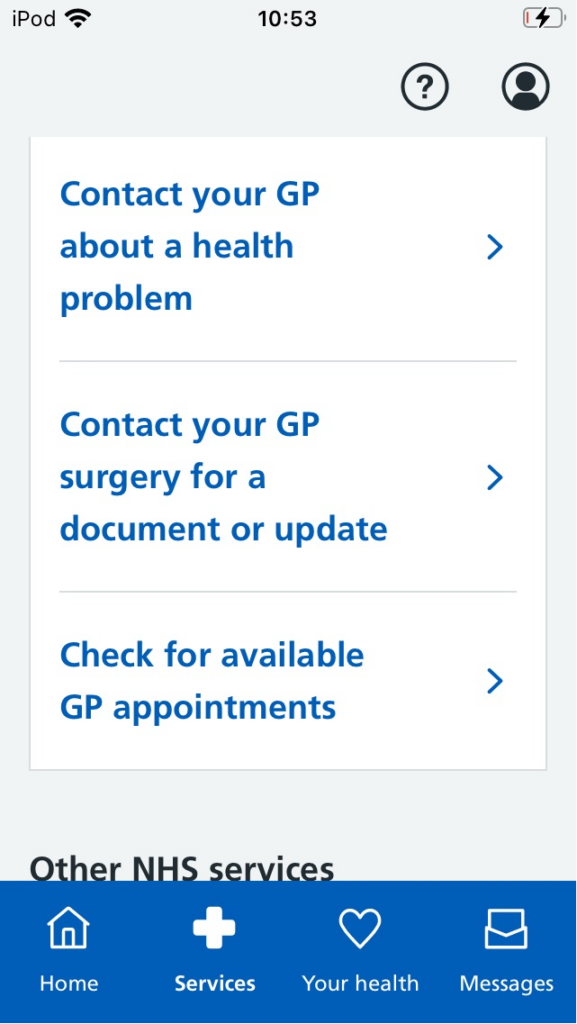Medicines
If you take medicine regularly, you’ll usually have a repeat prescription. Any new medicines or those for short-term use won’t be on your repeat list and you must request them separately.
Repeat Prescriptions
We recommend the NHS App or website to request all repeat prescriptions. You can use it to check the status of your request and see when we’ve sent it to the pharmacy for you to pick up.
Requests
Always try to request your medication in the 7 days before you run out. If you’re ordering early, please let us know why so we don’t reject the request. Please make sure you ask early enough so you don’t run out of medicine, especially if we are very busy.
These are the different ways to ask for your repeat prescriptions:
- Online, using the NHS App on your phone, tablet, or use the NHS login on your computer.
- Through your local pharmacy.
- Tick a box on your paper copy of repeat medication. Put it in the prescription box at our reception.
- Write it down and put it in the prescription box at our reception.
- Using another online service you have registered to use like Patient Access.
We don’t take repeat prescription requests over the phone. This helps stop mistakes and keeps our phones free for appointments and questions. But if you need your medicine urgently or in special situations, please call us.
The medication I need isn’t listed
If the medication you need isn’t on your repeat list, you can ask for it online. Click the + icon below for step by step instructions.
Next steps
We try to process your repeat prescription in 48 hours (2 working days). Remember this can be longer on weekends and bank holidays.
For new prescription requests, we will aim to process these as soon as possible. But these may take longer than 2 working days, depending on what the medication is and whether we can prescribe it.
Collecting your prescription
You can usually collect your prescription from the pharmacy 3 to 5 working days after you requested it. You will need to choose where you want to collect your prescriptions. We call this nominating a pharmacy.
You can change your nominated pharmacy at any time:
- at reception or by phone
- at any pharmacy that accepts repeat prescriptions
For now, New Road Surgery patients can’t use the NHS App but you can use a form to update your nominated pharmacy.
Questions about your prescription
If you have questions about your medicine, your local pharmacist can answer these. They can also answer questions on medicines you can buy without a prescription.
The NHS website has information on:
- how medicines work
- how and when to take them
- possible side effects
- answers to common questions
If you want to ask us questions about your medicine, please fill in the “medical issue” online form.
Medication reviews
If you have a repeat prescription, we may ask you to have a regular review. We will let you know when you need to come in or have a telephone appointment.
Pharmacists
Pharmacists are healthcare professionals who can offer advice on minor illnesses such as:
- coughs
- colds
- sore throats
- tummy troubles
- aches and pains
Pharmacists can suggest treatments for conditions that do not need a prescription. These are sometimes called over-the-counter medicines.
Some pharmacies also have private consultation rooms. This allows you to talk about your concerns with pharmacy staff in private. Some can also offer prescription medicine for some conditions, without seeing a GP.
Many pharmacies are open late and on weekends, and while no appointment is needed, you can call ahead to ask for one.
If suitable, we can also refer you to a pharmacy for a Pharmacy First consultation when you call us.
Please see the NHS information about the Pharmacy First service.
Conditions they can offer prescription medicine for are:
- impetigo (aged 1 year and over)
- infected insect bites (aged 1 year and over)
- earache (aged 1 to 17 years)
- sore throat (aged 5 years and over)
- sinusitis (aged 12 years and over)
- urinary tract infections (UTIs) (women aged 16 to 64 years)
- shingles (aged 18 years and over)
Shared Care Prescribing
Shared care is when a specialist doctor asks a GP to take over some of a patient’s care, like giving prescriptions. This can only happen if the GP agrees. The GP needs to think about whether it is safe to do so.
If the GP agrees, they will be responsible for the prescriptions they sign. They must explain their decisions and make sure the patient is properly monitored. This is a big responsibility, so the GP needs to be careful when deciding.
The General Medical Council (GMC) says that all doctors who prescribe medication must stay up to date about the medicines they give. They need to know how to spot serious side effects and make sure the right checks are in place.
What Shared Care Means
Shared care is voluntary for GPs. They should think about their own skills and how much work they already have before agreeing. The GP must balance the needs of one patient with the needs of everyone else they look after. Then they can decide if they can take on more work.
Specialist doctors can only hand over care if the GP agrees. This is often forgotten, but it’s important to respect the GP’s ability to work safely within their skills. The practice must be able to handle the extra work of prescribing and monitoring the patient. These are key parts of keeping patients safe.
For more information see our Shared Care policy




